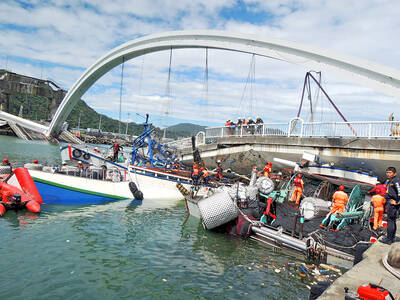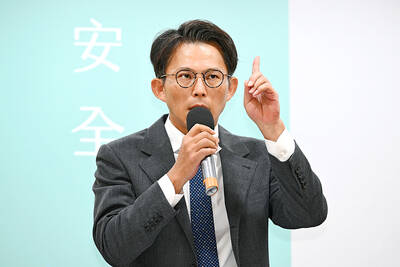Taipei Times: How did you get your job?
Ian Wright: I was doing video work with kids, community work and stuff like that and there was an advertisement in The Guardian and somebody said, "why don't you go for it?" I was like, hum? I mean, those jobs are so ludicrous and the other side of the fence that I really thought there was no point in going for it. They said send in a show-reel. So me and a mate did a little piss-take guide to London -- I was sitting on the bog shitting and talking about the rich food of the country, getting beaten up changing money on the black market and ended up in jail. The whole thing was a piss-take. I sent it in as a joke not knowing that Pilot Productions was looking for something a bit different. I got a letter saying come in for an interview and almost shit myself. Now, sixty programs on they can't get rid of me.
TT: How do feel about your job now you've been doing it for 10 years and how many countries have you been to?

PHOTO: GAVIN PHIPPS, TAIPEI TIMES
Wright: I ain't complaining. In fact, I'm the luckiest bastard in the world and it's better than working for a living. Oh, Jesus, 70 plus. You have to remember that on some shows we double up and there are two other presenters.
TT: Your job looks enviable. Is it as cushy and as ad-libbed in the field as it appears on TV?
Wright: No, I mean you're there to do a job and make a program, so it takes a lot of work. There are always 100 things to do and you don't get a day off. The production team spends a couple of months planning the trip and routes in the office and then the producer and director will fly out and spend three or four weeks on location before the rest of us fly out and spend another three or four weeks on location. ... Some countries, like Cambodia are easy. You can point the camera in any direction, say: "Lets go over there and see what they're doing," and it will work. But you can't do that everywhere. In Norway you can't say: "Hey, let's go over there and see what they're doing," cos' they'll just be watching [TV].
TT: Have you or the crew ever run foul of the authorities or the local population while filming a show?
Wright: There are five of us -- the director, cameraman, producer and a local guide or driver -- so you get into less scrapes than independent travelers would. I did nearly get beaten up in Japan. The director asked me to walk into a circle of rockabillies dancing in a park in Tokyo. I knew it was a no-no, but it was one of my first shows so I thought I'd go with what the director wanted. I didn't want to cause waves at the time. I got two steps into the circle, [the rockabillies] saw us filming and it got a bit dodgy.
TT: Do you have any particular favorite destinations?
Wright: Cambodia. And I adore everything above the Arctic Circle, as it so out there and nothing can relate to it. Greenland is an ice-cube in the middle of nowhere half the size of Europe. Fifty-five thousand people live there and there are no roads between any of the towns. I love it. It's a lovely country.
TT: Is there anywhere you haven't been but are itching to see? And do you enjoy traveling when you're on holiday?
Wright: I've never been to Vietnam or Central America. Both of which I'd love to go to. God yeah! I haven't got a camera shoved up my arse. It's heaven. I haven't got to do anything.
TT: Why do think that people are so crazy about you and the show?
Wright: In England nobody knows me. I call a cab and the taxi driver hears he's picking up Ian Wright (ex-Arsenal and England soccer star) looks at me, and wonders who the hell I am. They're nuts for [the show] in Norway and Canada, but in Asia people are absolutely nuts about it. ... And in Taiwan, well, I figure it's because the people here have a mad and cheeky sense of humor. It's sort of Englishy in a way, as they relish seeing someone taking the piss.

Before the recall election drowned out other news, CNN last month became the latest in a long line of media organs to report on abuses of migrant workers in Taiwan’s fishing fleet. After a brief flare of interest, the news media moved on. The migrant worker issues, however, did not. CNN’s stinging title, “Taiwan is held up as a bastion of liberal values. But migrant workers report abuse, injury and death in its fishing industry,” was widely quoted, including by the Fisheries Agency in its response. It obviously hurt. The Fisheries Agency was not slow to convey a classic government

Not long into Mistress Dispeller, a quietly jaw-dropping new documentary from director Elizabeth Lo, the film’s eponymous character lays out her thesis for ridding marriages of troublesome extra lovers. “When someone becomes a mistress,” she says, “it’s because they feel they don’t deserve complete love. She’s the one who needs our help the most.” Wang Zhenxi, a mistress dispeller based in north-central China’s Henan province, is one of a growing number of self-styled professionals who earn a living by intervening in people’s marriages — to “dispel” them of intruders. “I was looking for a love story set in China,” says Lo,

It was on his honeymoon in Kuala Lumpur, looking out of his hotel window at the silvery points of the world’s tallest twin skyscrapers, that Frank decided it was time to become taller. He had recently confessed to his new wife how much his height had bothered him since he was a teenager. As a man dedicated to self-improvement, Frank wanted to take action. He picked up the phone, called a clinic in Turkey that specializes in leg lengthening surgery — and made a booking. “I had a lot of second thoughts — at the end of the day, someone’s going

The next few months will be critical in determining the future of the Taiwan People’s Party (TPP). Following party founder Ko Wen-je’s (柯文哲) arrest in September last year, Huang Kuo-chang (黃國昌) effectively became the de facto face of the party and officially became chairman in January. While Ko frequently criticized the ruling Democratic Progressive Party (DPP) and insinuated sinister intentions on the part of the DPP’s New Tide faction, his era was largely defined by the TPP slogan “rational, pragmatic, scientific,” albeit defined largely by his definition of what that meant. The tone and language used by the TPP changed dramatically